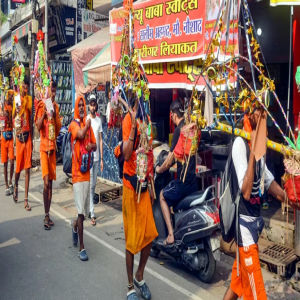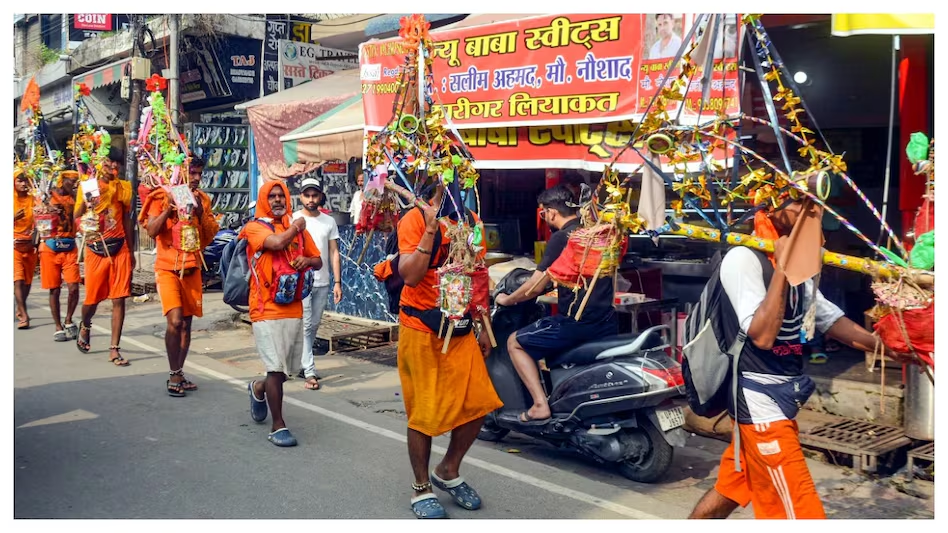
.png) Ram Puniyani
Ram Puniyani

The recent order requiring eateries in Uttar Pradesh and Uttarakhand to display name plates — which has been stayed by the Supreme Court — has drawn chilling comparisons to apartheid-era South Africa and Nazi Germany, where Jews were forced to identify their businesses, precursing brutal persecution.
In the 2024 general elections, the decline of the electoral clout of the Bharatiya Janata Party (BJP) and its failure to reach the majority mark sparked hope that the democratic decline in values of pluralism and diversity may see a recovery.
During the elections, having realised that Ram Temple magic was no longer effective, Narendra Modi resorted to divisive language all through. He blamed the INDIA bloc for doing mujra (dancing) for the minorities whom they want to please. It was also said that the INDIA bloc would change the Constitution to take away reservations of SC/ST/OBC and give them to the Muslims.
To add further punch to his rhetoric, the prime minister frightened the Hindu majority by saying that Hindu women's mangalsutra (chain indicating the marital status of some Hindu communities) will also be taken away and given to Muslims, among other such derogatory issues. As matters stood, this hate speech failed to benefit the BJP, and it slid down from 303 seats to 240 in the Lok Sabha.
This gave hope that minorities would be targeted less often and an atmosphere of amity would be promoted. The developments of the past few weeks in the National Democratic Alliance (NDA), led by the BJP, have dashed this hope. The statements and actions of the saffron party leaders and the government in the BJP-ruled states show that they will pursue their old tactics as far as possible.
Hemant Biswa Sarma, the Assam chief minister notorious for such outpouring, stated that Assam will soon become a Muslim-majority state. As per him, the percentage of Muslims in 1951 was 12% (later, he revised this figure to 14%), and now Muslims are 40% of the state population. His figures are totally fake, intended to stir up fear and alarm among Hindus. The percentage of the Muslim population in 1951 was 24.68% as per census figures, and as per 2011 census figures, Muslims in Assam are 34.22%. Old habits die hard for many. A classic case is here to be witnessed.
In West Bengal, where the BJP bit the dust coming down from existing 18 MP seats to 12 this time, party leader Suvendu Adhikari put the blame for the BJP's decline on Muslims and proclaimed: "We do not need to talk about Sabka Saath and Sabka Vikas (everybody's development, taking along everybody). We will decide who supports us, and we will support them. Stop this talk of Sabka Saath, Sabka Vikas." Many from the BJP stable disowned his statement, but Adhikari's words and tenor reveal the real political goals of this party.
To cap it all off in Muzaffarnagar, the deputy inspector general of police (DIG) issued instructions that on the route of the Kanwar Yatra (a pilgrimage devoted to Lord Shiva), all eateries, stalls, and hotels should display the names of the owners and workers right in front.
Notably, the Supreme Court on Monday (July 21) stayed these directions issued by the Uttar Pradesh and Uttarakhand governments, which directed eateries in the Kanwar Yatra route to display names. A bench of Justices, Hrishikesh Roy and SVN Bhatti, passed an interim order prohibiting the enforcement of the government directives.
As per the directive issued by the Uttar Pradesh local administration, "All the food outlets, eateries and food joints across the state will have to put up a nameplate," displaying the names of owners/proprietors and staff members."
"This has been done to maintain the 'purity of faith' for Hindu devotees who undertake the Kanwar Yatra, in the month of Shravan (a holy month as per the Hindu calendar)," the administration had claimed, justifying the move. Uttarakhand had joined Uttar Pradesh in announcing the rule, and multiple other BJP-governed states were set to follow suit, signalling a broader adoption of this policy.
In the face of criticism, the state administration added that this has to be done voluntarily. This is a very interesting order. Where does the volition exist for those who are supposed to follow it? The honourable prime minister, the supreme leader, has maintained a stoic silence on this order, indicating that this is the party's policy. This move has been criticised by the BJP's NDA allies like Janata Dal-United and Lok Janshakti Party (Ramvilas Pasvan), among others. This is a case where we come to know that in the coalition, the allies of the BJP don't matter to the prime minister, and the BJP will rule the roost.
However, this is probably the most divisive step taken by the BJP. Already, Muslim employees of Hindu establishments on the route have been laid off. The notion of purity and pollution should not be applicable in present times. The Kanwar Yatra from Haridwar to the local Shiva temples is a fairly old phenomenon. It became more prominent during the last few decades, from the 1980s onwards, quite in tune with the rise of politics in the name of religion, beginning with the Ram Temple movement. Now lakhs and lakhs of people participate in it.
Let's imagine the implications of such a directive. Most commentators recalled the apartheid regimes of South Africa and Nazi Germany. In Nazi Germany, the Jews were on the receiving end of fascist politics. They were asked to display the 'Star of David' in front of their establishments and wear the same on their body. Their persecution became easy as their establishments could already be easily identified. On the Kanwar route, the step seems to be an anticipatory one, and it is likely that the BJP in other states, on other pretexts, may find this an easy way to identify Muslims.
At present, it seems that sectarian politics is deeply rooted within the body politics of the nation. Electorally defeating this party and its opportunist allies is a mere first step to restoring pluralism in the country. The targeting of the Muslim community is also running parallel to a decline in their political representation. The Rashtriya Swayamsevak Sangh-BJP (RSS-BJP) ideologues are arguing that they tried to de-communalise Muslim politics.
It is a hoax, as the present episode shows. Still, they are totally silent on why the BJP does not have a single Muslim MP in Lok Sabha, not a single Muslim minister in the Cabinet at any level. They argue that now the BJP is trying to link with the Pasmanda Muslims. Do they realise who is the biggest victim of the BJP's politics? Just in the case of the present Kanwar Yatra episode, one can tell that the Pasmanda Muslims would have been the biggest losers with the present move of the BJP if the apex court hadn't stayed the directions.
One feels the INDIA coalition should vociferously oppose such a move of the BJP as it is imperative that inclusive values be brought to the forefront to confront such regressive policies aiming at further splitting the society and taking one more step towards a Hindu nation.